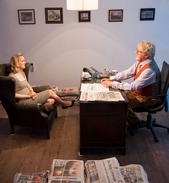SITE GUIDE
SEARCH
REVIEWS
REVIEW ARCHIVES
ADVERTISING AT CURTAINUP
FEATURES
NEWS
Etcetera and
Short Term Listings
LISTINGS
Broadway
Off-Broadway
NYC Restaurants
BOOKS and CDs
OTHER PLACES
Berkshires
London
California
New Jersey
DC
Connecticut
Philadelphia
Elsewhere
QUOTES
TKTS
PLAYWRIGHTS' ALBUMS
LETTERS TO EDITOR
FILM
LINKS
MISCELLANEOUS
Free Updates
Masthead
Writing for Us
A CurtainUp  London Review
London Review
 London Review
London ReviewEnquirer
|
Journalism is a sexy profession, full of ugly people.
— John Bett’s character, a seasoned journalist
|

(Photo: Manuel Harlan) |
A group of 60 audience members are ushered into a large meeting room round a table where six actors make dramatic entrances and launch into statements about the media. When we first meet Hywel Simons’s character he tells us about his training on a small provincial Welsh paper, where he was daily challenged in the small town high street about articles that he had written by people he met. This is later contrasted with the impersonality of internet journalism when instead of looking at the content, all that interests anyone is the number of hits globally. Everyone has something to say and non sequiturs abound.
After the initial meeting, we are taken off down the stairs to “The Wires” an introduction to the connections with organisations like Reuters and the Press Association, who distribute news worldwide. Some of us sit on bundled newspapers taped together. In every room there are on screens continuous news television channels playing reminding us of the current stories. On the wall, a complicated sociogram on the blackboard links everyone back to Rupert Murdoch, the chief of News International, owner of many daily papers worldwide and focus of some of the recent enquiries into incidents like mobile phone hacking, which have concerned the Leveson Enquiry. In one room a tall filing cabinet opens to quirkily reveal Gabriel Quigley at a typewriter surrounded by piles of papers.
We meet Jack Irvine (Billy Riddoch) a veteran of the Scottish newspaper industry who tells of his career from a sub editor to editor of the Scottish Sun at its launch in 1987 to Managing Director of Murdoch, Scotland. He talks about “the payments book” that recorded who had been paid for a story and gives us an in depth interview of a man at the top of his game. We hear how Rebekah Brooks while editing The Sun turned down the huge scandal of MPs’ expenses story which went subsequently to The Telegraph.
An interview between Deborah Orr (Gabriel Quigley) and Roger Alton (John Bett), one time editor of The Observer talks about the death on reporting duty in Syria, in February this year, of Marie Colvin, war reporter of The Sunday Times and this theme is returned to later in the production when Maureen Beattie recounts Ros Wynne-Jones’s experiences in war zones. Her piece on a terrible massacre in East Timor is pushed off the front page and made to wait several days because of the announcement of a minor royal wedding. In some rooms the chairs are overturned, the filing cabinets’ contents are strewn on the floor and phones lie with cut off cords in a visual picture of disintegration and chaos.
Directors and Editors, Vicky Featherstone and John Tiffany with author Andrew O’Hagan have the imagination and skill to have turned this mass of words into exciting theatre. We are ever on the move to an appealing percussive music between scenes which puts a spring in our step for what could have been interminable changeovers in promenade performances. In a final scene our actors are snuggled up in eiderdowns of shredded paper with just their heads on view. There is plenty to look at and even more to think about as tabloid journalism is called upon to account for its actions. In a telling scene one journo reminds us that it is the British public who buys these papers . . . . And their thirst for the sensational, the scandalous and the salacious which drives the press. The theme of Enquirer is to ask the people in the industry themselves “how British journalism has fallen so low?”
|
Subscribe to our FREE email updates with a note from editor Elyse Sommer about additions to the website -- with main page hot links to the latest features posted at our numerous locations. To subscribe,
E-mail: esommer@curtainup.comesommer@curtainup.com
put SUBSCRIBE CURTAINUP EMAIL UPDATE in the subject line and your full name and email address in the body of the message -- if you can spare a minute, tell us how you came to CurtainUp and from what part of the country. |
| Enquirer
Based on interviews by Paul Flynn, Deborah Orr and Ruth Wishart Directors and Editors: Vicky Featherstone and John Tiffany Co-Editor: Andrew O’Hagan Starring: Maureen Beattie, John Bett, James Anthony Pearson, Gabriel Quigley, Billy Riddoch and Hywel Simons. Design Consultant: Chloe Lamford Lighting: Lizzie Powell Running time: One hour 45 minutes without an interval A joint production from the National Theatre of Scotland and the London Review of Books Box Office: 020 7638 8891 but sold out Booking to 21st October 2012 Reviewed by Lizzie Loveridge based on 5th October 2012 performance at Mother at The Trampery, 188-192 St John’s Street, London EC1V 4JY (Tube: Barbican or The Angel and a l5/20 minute walk or 153 bus) |
|
REVIEW FEEDBACK Highlight one of the responses below and click "copy" or"CTRL+C"
Paste the highlighted text into the subject line (CTRL+ V): Feel free to add detailed comments in the body of the email . . . also the names and emails of any friends to whom you'd like us to forward a copy of this review. |




